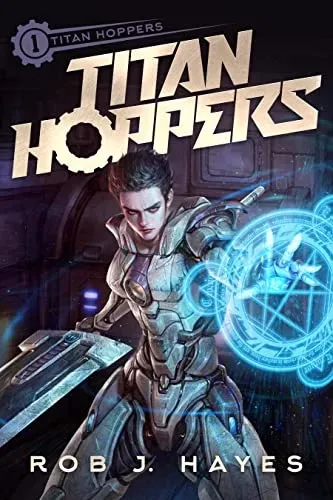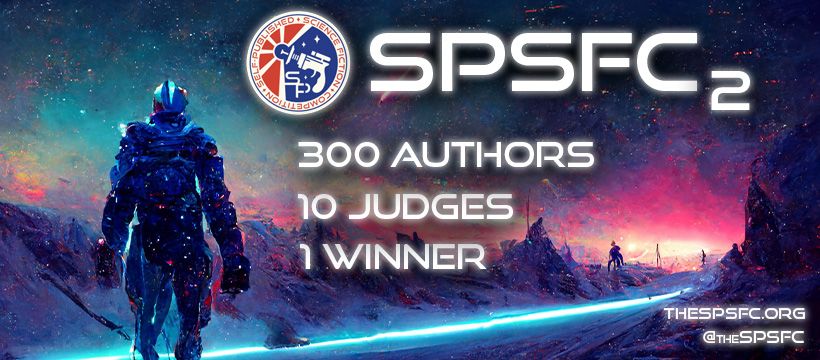
Author: Rob J Hayes
Author Twitter: @RoboftheHayes
Author Website: https://www.robjhayes.co.uk/
Book Links: Amazon | Goodreads
Genre: Progression Sci-Fantasy
Word Count: 140,000
My Rating: 8.5/10
Titan Hoppers is a fast-paced sci-fantasy with progression elements, which follows the story of Iro, a Talentless but determined trainee, as he trains to become an eponymous Titan Hopper. In this world, humanity survives in a fleet of spaceships scavenging resources from mysterious Titans, constructs the size of moons that house deadly monsters and traps the fleet's Titan Hoppers must overcome.
If that setting sounds interesting, I agree! The worldbuilding in this book is well-executed from the get-go. It gives us all the information we need to orient ourselves in the world while saving more details to be doled out later in the story. There's a fine balance to be struck when delivering important details about the setting in this one. On the one hand, it can feel like the author is making it up as they go, giving you information just in time for it to be useful—ultimately making the story feel hollow. On the other, doing it this way reduces the learning curve of the book and makes it easier to recommend to a wider audience. I think Rob J Hayes has struck that balance expertly. I never felt like anything was being told out of convenience, there was a satisfying amount of setup/payoff, and the story read as smooth as butter. That takes true skill to pull off, and I appreciated it, but as with all books, your mileage may vary.
Another aspect that will determine whether you get on with this book is how quickly you embrace the "progression" elements in the magic system. For me, it felt rather video gamey at first, bringing me back to my high school days playing World of Warcraft. There are different classes of characters—Paladins, Corsairs, Mages, Vanguards, and so on—who develop unique Talents as they level up through Gates of Power. Those level up mechanics were so heavy, one might assume there's an associated action RPG skill tree somewhere in the author's reference files. (Is there, Rob? It's okay, you can tell us.) If not, those elements were communicated with enough clarity that fans could probably produce skill trees on their own.
That level of clarity is why I ultimately accepted the progression elements and just sat back to enjoy the story. Not only are they easy to understand at all points, but they're also used to great effect to demonstrate the differences in power level between the characters we follow and the Masters of the fleet (not to mention the monsters). Not only did that give me something to look forward to as Iro and the other POV characters grow in strength, but it was also used to raise the stakes of the story more effectively than I've seen in most other books.
Moving on to some elements that didn't work quite as well for me—the characters and the plot. There are several POV characters in the book, but I would say two are the "main" characters—Iro and Emil—with much more page time given to Iro's POV. There are some other POVs, but they're mostly there to move the plot along and give you some insight into some side characters' interiority. (One of the side characters, Rollo, is very enjoyable to read though!)
Of the two, Iro wasn't the most interesting in terms of development or complexity. He serves well as a main protagonist who wants to be brave and strong, living up to his sister's legacy despite being the weakest of the bunch, and he's certainly determined enough to pull it off. I haven't read much progression fantasy, but if you would have asked me what I imagine a progression fantasy protagonist to be, he would likely have many of the same traits as Iro. Someone who wants to be strong (because he has to progress), and who is determined (because he's going to face obstacles to his progression), and who is the weakest (so he has the most room to progress). His most interesting aspect was that he really isn't brave for much of the story, freezing up when he needs to act. He's also a bit of a social weirdo, which is pretty endearing. In all, it works fine. He just wasn't a standout to me.
Emil, on the other hand, despite having fewer chapters, had a level of depth and internal conflict that was much more interesting to me. He has a terrible life with an abusive father, he's a glutton for punishment, he's extremely stubborn and proud, and he really only works with the other Hoppers because he's forced to. He can also feel a bit one-note throughout the story, and while it's understandable given his background, it makes him a more unlikeable character than Iro. Despite that, my favorite moment in the book was his chapter in the climax.
In terms of the plot, the only section I really had an issue with was the very beginning. It kicks off with a tragic event that propels Iro's story; however, it all seemed to happen too quickly. I never felt an emotional connection to the character who plays such a big part in Iro's mental state throughout the story, which felt like a shame to miss out on. Instead, I felt as though those sections were cut short so we could get right to the action, which, admittedly, was great. Still, I wanted to feel something more at the beginning, but perhaps that's too big an ask for a character who only lasts a page or two.
Wrapping up, Titan Hoppers was an entertaining read all the way through. I had to accept the progression elements, which felt a bit jarring at first, but once I did I enjoyed the story for what it was. There are going to be five more books in this series, so there's lots of progressing to do, and I'm excited to see just how wild some of those combat scenes can get. Even at this early stage, the book was full of high stakes dungeon crawling fun, so I'll definitely be picking up book two when it comes out.
/* Note: This review reflects only my personal opinion of the book, not the opinion of the entire Team Sciencefiction.news */


